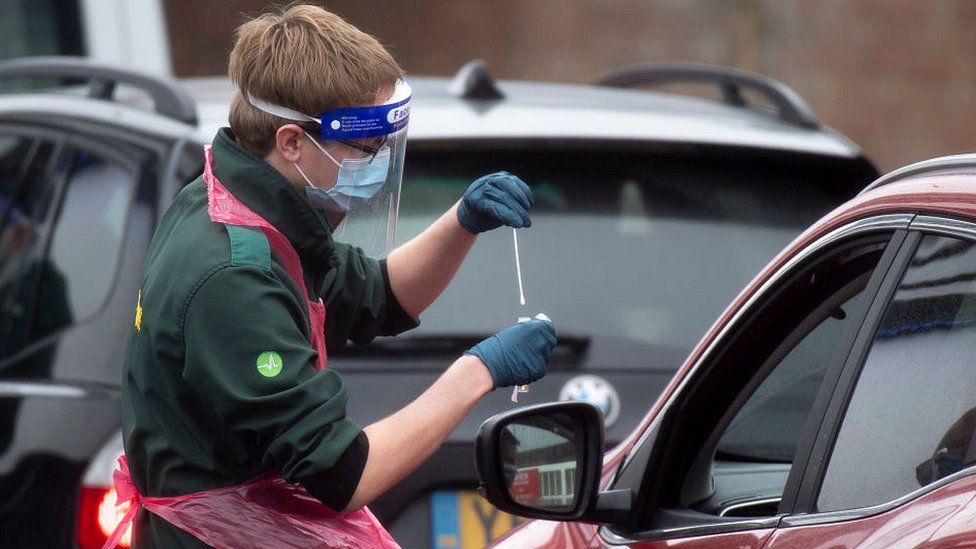
The government's scientific advisors have estimated the virus is reproducing at a rate of between 0.8 and 1.
Anything below one means infections are in retreat.
Meanwhile Office for National Statistics (ONS) figures suggest cases are decreasing slightly or levelling off across Britain.
In Northern Ireland, however, cases have continued to rise and the new, more infectious strain has overtaken the older variant of the virus as of the start of January.
During the week ending 16 January, about one in 55 people in England had the virus, the ONS estimated, with one in 35 in London testing positive.
One 100 people had the virus in Scotland and one in 70 in Wales.
But in Northern Ireland infections have shot up from an an estimated one in 200 people testing positive in the week to 2 January, to one in 60 last week.
ONS statistician Sarah Crofts said while fewer people were testing positive in England, "rates remain high and we estimate the level of infection is still over one million people".
And, she pointed out, "the picture across the UK is mixed".
A survey by tech company ZOE and King's College London, based on swabs of people with and without symptoms, also suggested the R number could be at 0.8.
And it estimated symptomatic cases had fallen by a quarter since last week.
In a statement, the Department of Health and Social Care said: "There is variation across the country with R estimated to be below one in areas that have been under tighter restrictions for longest.
"Cases remain dangerously high and we must remain vigilant to keep this virus under control, to protect the NHS and save lives.
"It is essential that everyone continues to stay at home, whether they have had the vaccine or not."
Prof David Spiegelhalter at the University of Cambridge said: "Overall it looks like getting down to nearly half of where we were three weeks ago, which is enormously hopefully".
But he explained that the change in infections was taking a while to feed through to a fall in new hospital admissions, and couldn't yet be seen in the total number of hospital patients or deaths.
"We probably won't see that until the end of the month," he said.
And by next month, "we will start seeing the benefits of the vaccine".
The proportion of people testing positive for the new Covid variant has risen considerably in Scotland, Wales and Northern Ireland, ONS data suggest.
But the new strain, which remains by far the main source of infections in England, has yet to overtake the old strain in Scotland and Wales.
Within England, the proportion of infections that appear to be due to the new variant remained stable, but the gap between the regions is narrowing.
In the figures covering 2 January, 80% of infections looked like the new variant in London compared to 30% in the North East.
Two weeks later, that gap had narrowed to 70% in London versus 50% in the North East.
It's not clear what is behind the small fall in London, but it may be down to behaviour change, or other variants like the South Africa strain now in circulation and diluting the numbers.
https://ift.tt/3pdw7wA
Health
Bagikan Berita Ini














0 Response to "Covid: New virus variant on the rise in UK nations - BBC News"
Post a Comment